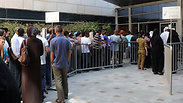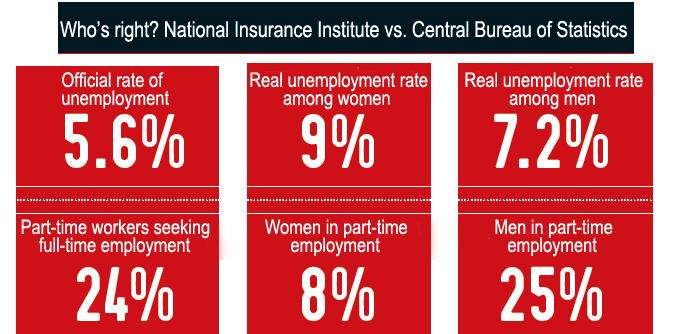
New data shows unemployment in Israel higher than stated
National Insurance Institute recalculates figures to include part-time workers seeking full-time positions and those who have given up on job market.
Unemployment in Israel stands at 7.2 percent among men and 9 percent among women and not 5.6 percent overall as published by the Central Bureau of Statistics, say National Insurance Institute officials. Furthermore, say the NII sources, a quarter of the country's employees who work part-time jobs would like to work full time.
Unemployment rates in Israel are considered very low in relation to the Western world; but a new NII study claims that the true unemployment rate in Israel is actually much higher. The reason: Many Israelis are employed in part-time positions but would like to work full time, and many Israelis have given up on looking for work. These individuals, according to the official unemployment figures, are not defined as unemployed. The NII believes otherwise.
Related articles:
- Grading Netanyahu's economic policies
- Massive wave of layoffs sweeps Negev
- High-tech boom a double-edged sword for Israel
The NII study suggests that the unemployment rates should be significantly higher than those currently presented, noting that the figures should include individuals who have given up on seeking employment and also part-time workers who wish to find full-time jobs. "Including these figures when calculating unemployment would give a more accurate rate," the NII report claims.
"People working part-time jobs because they can't find full-time are unemployed for that portion of time during which they would like to be working," the report adds.
NII officials argue that these figures should be included in the calculation of the unemployment rate as they have a strong bearing on the formulation of economic policy.
The study refers to the period 2000-2011 and claims that the real unemployment rates during those years were higher than the official figures reported by the CBS. According to the CBS index, unemployment among both men and women in 2011 stood at approximately 5.5 percent.
But the study claims that if part-time workers and people who had despaired of finding work are taken into account for that year, unemployment among men would reach 7.2 percent, and 9 percent among women.
According to the study, some 24 percent of the country's part-time workers would like to find full-time jobs but aren't able to do so.
The study also notes that more than half the men who work part time in the construction industry would like to work on a full-time basis, and the same goes for men who work part time in the household services sector. Among women, the study notes, around 30 percent who work part time in the education sector would like to find full-time employment, and almost 25 percent of the women employed part time in the health and welfare sector want to find full-time jobs.
"The unemployment rate plays a major role in determining macro-economic indices, such as the interest rate set by the Bank of Israel, and also when it comes to formulating economic policy," the report says.
"The conclusion that emerges from the results of the study is that the phenomenon mentioned herein should be taken into consideration for the calculation of a comprehensive unemployment rate, as these are individuals who are actively seeking work or have looked for work but have despaired."











